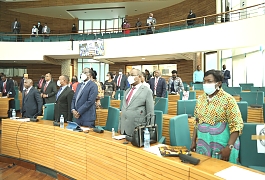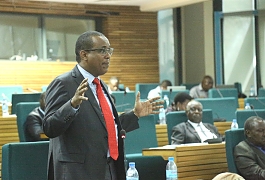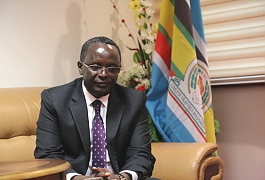In regards to the International day for the Elimination of Violence against women that falls on the 25th November 2009, The EALA 72nd Sitting held on the 17th November 2009 adopted a resolution for the Assembly to urge the EAST African Community and Partner States to take urgent and concerted action to end violence against Women in the EAC region and Particular partner States.
RESOLUTION OF THE ASSEMBLY URGING THE EAST AFRICAN COMMUNITY AND PARTNER STATES TO TAKE URGENT AND CONCERTED ACTION TO END VIOLENCE AGAINST WOMEN IN THE EAC REGION AND PARTICULARLY THE PARTNERS STATES
By: Hon. Safina Kwekwe Tsungu
THAT THIS ASSEMBLY
AWARE that discrimination on the basis of one’s gender especially against the female gender is contrary to the Charter of the United Nations, the Universal Declaration of Human Rights, the Convention on the Elimination of all Forms of Discrimination against Women, the African (Banjul) Charter on Human and Peoples Rights, provisions of the Millennium Development Goals and all other international human rights instruments and that its elimination is integral to enshrined principles of justice and fundamental rights of human beings;
RECALLING that this Assembly has previously adopted resolutions in support of the rights of women;
FURTHER RECALLING that a number of efforts have been directed towards the elimination of violence against women (VAW) especially on the global and regional scene especially by the United Nations system in general and specifically through its organs and specialized agencies in various fora particularly after the Beijing Declaration and Platform for Action adopted in 1995 by the Fourth World Conference on Women, the follow-up action by the Commission on the Status of Women on violence against women and the outcome of the 23rd Special Session of the UN General Assembly in 2000;
WELCOMING THE SIGNIFICANT WORK through out the world in the last 15 years to eliminate violence against women and girls, its causes and consequences;
SPECIFICALLY COMMENDING the Establishment of the United Nations Division for the Advancement of Women;
NOTING WITH APPRECIATION that the UN Launched in 2008, through United Nations Secretary-General Ban Ki-moon’s- the “UNiTE to End Violence against Women campaign”, which is a multi-year effort aimed at preventing and eliminating violence against women and girls in all parts of the world and which calls on governments, civil society, women’s organizations, young people, the private sector, the media and the entire UN system to join forces in addressing the global pandemic of violence against women and girls.
COGNIZANT of practical efforts by UNIFEM through its campaign, “Say NO to Violence against Women”, which is a global advocacy effort on ending violence against women, designed to support UN’s multi-year UNiTE to End Violence against Women campaign and aimed at demonstrating that there is an ever-growing movement of people who Say NO to violence against women and Say YES to make ending it a top priority for governments everywhere;
CONGRATULATING THE UNITED REPUBLIC OF TANZANIA as a signatory to UNIFEM’s Say NO to Violence against Women campaign on 24 May 2008 and the subsequent dissemination of various information regarding violence against women in order to sensitize her citizens on issues of outdated, primitive and immoral cultural attitudes and beliefs.
CONVINCED that the above provisions are implied in Article 3 (b) of the Treaty for the Establishment of the East African Community and binds the EAC Partner States to adhere to universally acceptable principles of good governance, democracy, the rule of law, observance of human rights and social justice while participating in any of the Community’s activities;
NOTING that Article 5 (3) (e) underscores the mainstreaming of gender in all the Community’s endeavors as an objective of the Community;
FURTHER NOTING that one of the Community’s central obligations is to enhance the role of women in socio-economic development as stipulated in Article 121 and 122 of the Treaty;
RECOGNIZING that the Republic of Burundi; Republic of Kenya; Republic of Rwanda; Republic of Uganda; United Republic of Tanzania each signed and subsequently ratified the CEDAW on 8th January 1992; 9th March 1984; 2nd March 1981; 22nd July 1985 and 20th August 1985 respectively ;
FURTHER RECOGNIZING that all the EAC Partner States are signatories of the Protocol to the African Charter on Human and Peoples’ Rights on the Rights of Women in Africa (the Maputo Protocol) which is instructive on promotion of human and peoples rights;
CONGRATULATING the Republic of Rwanda and the United Republic of Tanzania for having ratified the Maputo Protocol on 2nd June 2004 and 3rd March 2007 and deposited the instruments of Ratification with the AU on 1st July 2004 and 7th May 2007 respectively;
CONCERNED that the Republics of Kenya, Uganda and Burundi are yet to ratify the Maputo protocol;
FURTHER CONCERNED that the Republic of Kenya expressed reservations on the Maputo Protocol, in 2003 alongside Sudan, Tunisia, Namibia and South Africa, specifically on Article 6 on Marriage and Article 7 on Separation, Divorce and Annulment of Marriage; reservations of which have not been resolved to date;
DEEPLY CONCERNED that the intersection between VAW and HIV/AIDS is a major cause and consequence of HIV/AIDS infection and death for women and girls;
SADDENED by the critical and unfair allegations made about the Maputo Protocol such as that by Human Life International® Virginia USA on its 2007 publication titled “The Maputo Protocol: Clear and Present Danger”
DEEPLY CONCERNED that some groups of women, such as women who find themselves in refugee and internally displaced persons situations, women in situations of armed conflict, destitute women, women living in rural or remote communities, women in detention centers, migrant women, the girl child, women with disabilities, elderly women and widows are often the chief targets of organized violence against them because of their vulnerability;
REAFFIRMING the responsibility of all States to put an end to impunity and prosecute all those responsible for violence in all its forms including violence against women and using these 16 days of activism against the Vice;
NOW THEREFORE DO RESOLVE AS FOLLOWS: THAT -
1. WE Affirm that the term “violence against women” is as understood by the United Nations system and categorically means “any act of gender-based violence that results in, or is likely to result into physical, sexual or psychological harm or suffering to women, including threats of such acts, coercion or arbitrary deprivation of liberty, whether occurring in public or in private life, and including domestic violence, crimes committed in the name of honour, crimes committed in the name of passion, trafficking in women and girls, traditional practices harmful to women, including female genital mutilation, early and forced marriages, female infanticide, dowry-related violence and deaths, acid attacks and violence related to commercial sexual exploitation as well as economic exploitation”;
2. WE Strongly condemn all acts of violence against women and girls and urge the Partner States to continue with practical measures to eliminate all forms of gender-based violence whether in the family, within the general community and where perpetrated or condoned by officials, and to exercise due diligence to prevent, investigate and, in accordance with national legislation, punish acts of violence against women and to take appropriate and effective action concerning acts of violence against women, whether those acts are perpetrated by officials, by private persons or by armed groups or warring factions, and to provide access to just and effective remedies and specialized services, including medical, assistance to victims;
3. WE note with added emphasis, that violence against women has an overall impact on their physical and mental health, including their reproductive and sexual health. WE therefore encourage and urge the Partner States to ensure that women have access to comprehensive and accessible health services and programmes whether by government institutions or private practitioners to minimize the adverse physical and psychological consequences of violence;
4. The EAC Partner States be urged through the Council to take note that ending violence against women requires a comprehensive and an all-inclusive approach. Therefore, in addressing VAW, Partner States are urged to take into account the context in which women evolve thus all policies, laws and budget decisions should be structured to positively impact on women since they have the potential to increase their vulnerability to violence;
5. The EAC Partner States through the Council do recall that their obligations under the Convention on the Elimination of All Forms of Discrimination against Women must be implemented fully with regard to violence against women;
6. The EAC Partner States through the Council be urged to consider signing and ratifying the Maputo Protocol or any other legal framework of equal measure and in as much as is feasible do limit the extent of any reservations to the Protocol(s), and where it is unavoidable, to formulate any such reservations as precisely and as narrowly as possible, to ensure that no reservations are incompatible with the object and purpose of the Protocol(s), and to review their reservations regularly with a view to resolving them;
7. The EAC Partner States be urged through the Council to implement in whole the provisions of the Maputo Protocol and all international instruments on VAW as they have ratified;
8. The EAC Partner States through the Council do take practical steps aimed at building a strong and effective legal framework which, is fundamental to eliminate violence against women, and in this regard, are urged to harmonize laws or enact evidence based legislation that seeks to eliminate VAW;
9. The Council of Ministers and the Partner States do take practical steps to enhance the mainstreaming of gender and human rights into budgets, education as well as sensitization campaigns as a means of heightening the visibility of VAW from grassroots levels to national structures;
10. The EAC Partner States through the Council do intensify efforts to raise collective and individual awareness about VAW as away of promoting attitudinal and behavioral change in support of advancement of women;
11. The EAC Partner States through the Council do establish a friendly environment for the development of alliances aimed at eliminating VAW, particularly efforts between men and women; forging national and regional consensus on the need to address VAW as a priority; and building coordinated alliances with stakeholders including political parties, Civil society and grass root organizations;
12. The EAC Partner States through the Council do support initiatives undertaken by women’s organizations and non state actors on the elimination of violence against women and to establish and/or strengthen, at the local and national levels, collaborative relationships with relevant stakeholders aimed at the development and effective implementation of efforts against VAW;
13. The EAC Partner States be urged through the Council of Ministers to building strong institutional frameworks to act as a plan of action against VAW. Such action should be guided by the need to have parliamentary committees dedicated to advocate for the elimination of violence against women, increased representation of women in decision making bodies, development of national strategies to mainstream gender to secure a coordinated approach and response to VAW;
14. EALA and all National Assemblies/Parliaments of EAC do carryout regular oversight for the effective implementation of legislation through adequate budgetary allocation, access to comprehensive sex-aggregated data generated by strong and credible statistical capacities; setting up of parliamentary bodies charged with overseeing the implementation of VAW legislation; promotion and creation of specific inter-institutional mechanisms, put to task the Executive to make them accountable and work with other actors to encourage and support them in putting an end to VAW; and
15. EALA and National Assemblies/Parliaments of EAC do enact and, where applicable, reinforce or amend legislation to enhance efforts against VAW.
Mr. Speaker, Sir, I beg to move.
MOVED BY: HON. SAFINA KWEKWE TSUNGU
NOVEMBER 2009, ARUSHA, TANZANIA



